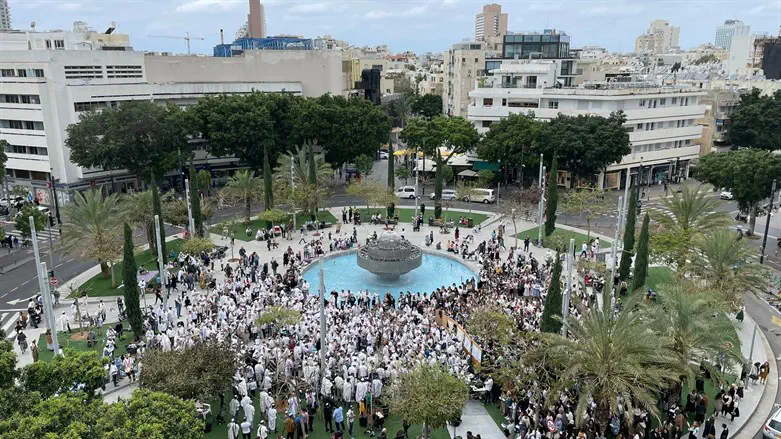
The Supreme Court has overruled the position of the Tel Aviv municipality against gender-separated public prayer on Yom Kippur. The traditional public service will be held in Gan Meir.
The Tel Aviv municipality this evening (Wednesday) rejected a compromise proposal put forward by Supreme Court judges in an appeal by the Rosh Yehudi organization and several residents against the Tel Aviv municipality regarding its decision not to allow gender separation during prayer in Dizengoff Square in Tel Aviv on Yom Kippur.
Orthodox Jewish prayers are traditionally held with a physical partition between men and women, and with the roles of cantor and sexton being filled by men only. This tradition nothing to do with equality, but is meant to avoid distractions when speaking to the Almighty.
Judges David Mintz, Ofer Grosskopf, and Yael Kasher criticized the city's conduct throughout the hearing and found it difficult to understand its principled opposition to holding prayer in a public space. They presented a compromise proposal to hold the prayer in Meir Garden instead of Dizengoff Square. The municipality representatives went to consult and, upon returning to the courtroom, clarified that the municipality opposed the compromise proposal because the city is against gender separation in public spaces.
Judge David Mintz clarified to the city's attorney, Shmuel Zinger, "These are difficult times. In any case, the issue should not have reached the court. Certainly not an issue of prayer on Yom Kippur. With goodwill, it can be resolved outside the court walls." The judges were angry with the city's conduct and noted that "what emerges is that a municipality in the State of Israel seeks to discriminate against Orthodox worshippers."
The city's representative argued in response that there is no discrimination, and Judge Grosskopf responded, "should we allow the Tel Aviv municipality to determine which prayer is legitimate? The public will decide for itself."
Judge Kasher emphasized: "Tel Aviv Municipality says - 'Orthodox no, everyone else yes', while there is 'relevant diversity' that allows for gender separation in prayer. You say: 'I am not against prayer, only against the partition', but that's like saying, 'I only have a problem with a kippah'."
One of the opponents' representatives argued that the prayer blocks the public space, and Judge Kasher reacted angrily: "Any event in a public space blocks it. Even a demonstration. So let's declare it will be a 'Yom Kippur prayer demonstration'."
The Rosh Yehudi organization responded to the ruling: "The Rosh Yehudi organization welcomes the Supreme Court's decision to allow prayer with a partition in the public space. Tel Aviv is part of the Jewish state and also there those who wish to pray with a partition will be able to do so."
"We are pleased that the court has allowed us to pray in our way, according to our faith and according to the tradition of Israel. Judaism is stronger than any municipal ordinance and than the unfortunate decision of the Tel Aviv municipality to exclude from the public domain the traditional public and the Judaism itself. Yom Kippur is a holy day for the entire Jewish people and we hope that the prayers will pass in peace and unity among all parts of the people. We call on all our neighbors to unite in prayer for the return of our hostages and the victory of our soldiers.''
